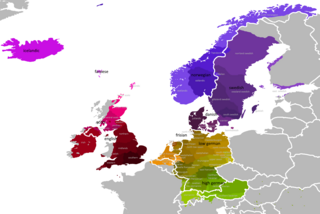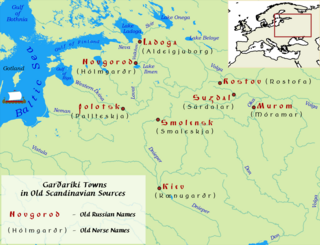Related Research Articles

The Germanic languages are a branch of the Indo-European language family spoken natively by a population of about 515 million people mainly in Europe, North America, Oceania and Southern Africa. The most widely spoken Germanic language, English, is also the world's most widely spoken language with an estimated 2 billion speakers. All Germanic languages are derived from Proto-Germanic, spoken in Iron Age Scandinavia and Germany.

German is a West Germanic language in the Indo-European language family, mainly spoken in Western and Central Europe. It is the most widely spoken and official or co-official language in Germany, Austria, Switzerland, Liechtenstein, and the Italian province of South Tyrol. It is also an official language of Luxembourg and Belgium, as well as a recognized national language in Namibia. There further exist notable German-speaking communities in France (Alsace), the Czech Republic, Poland, Slovakia, Denmark, Romania and Hungary (Sopron).

The Romance languages, also known as the Latin or Neo-Latin languages, are the languages that are directly descended from Vulgar Latin. They are the only extant subgroup of the Italic branch of the Indo-European language family.

In Celtic mythology, Taranis is the god of thunder, who was worshipped primarily in Gaul, Hispania, Britain, and Ireland, but also in the Rhineland and Danube regions, amongst others. Taranis, along with Esus and Toutatis, was mentioned by the Roman poet Lucan in his epic poem Pharsalia as a Celtic deity to whom human sacrificial offerings were made. Taranis was associated, as was the Cyclops Brontes ("thunder") in Greek mythology, with the wheel.

Proto-Germanic is the reconstructed proto-language of the Germanic branch of the Indo-European languages.

Old High German is the earliest stage of the German language, conventionally identified as the period from around 500/750 to 1050. Rather than representing a single supra-regional form of German, Old High German encompasses the numerous West Germanic dialects that had undergone the set of consonantal changes called the Second Sound Shift.
In Germanic paganism, a seeress is a woman said to have the ability to foretell future events and perform sorcery. They are also referred to with many other names meaning "prophetess", "staff bearer", "wise woman" and "sorceress", and they are frequently called witches or priestesses both in early sources and in modern scholarship. In Norse mythology the seeress is usually referred to as völva or vala.

Garðaríki or Garðaveldi was the Old Norse term used in the Middle Ages for the lands of Rus'. According to Göngu-Hrólfs saga, the name Hólmgarðaríki was synonymous with Garðaríki, and these names were used interchangeably in several other Old Norse stories.

Frankish, also known as Old Franconian or Old Frankish, was the West Germanic language spoken by the Franks from the 5th to 9th century.
In the Germanic languages, a strong verb is a verb that marks its past tense by means of changes to the stem vowel. The majority of the remaining verbs form the past tense by means of a dental suffix, and are known as weak verbs.

In historical linguistics, the High German consonant shift or second Germanic consonant shift is a phonological development that took place in the southern parts of the West Germanic dialect continuum in several phases. It probably began between the 3rd and 5th centuries and was almost complete before the earliest written records in High German were produced in the 8th century. From Proto-Germanic, the resulting language, Old High German, can be neatly contrasted with the other continental West Germanic languages, which for the most part did not experience the shift, and with Old English, which remained unaffected.
Like many other languages, English has wide variation in pronunciation, both historically and from dialect to dialect. In general, however, the regional dialects of English share a largely similar phonological system. Among other things, most dialects have vowel reduction in unstressed syllables and a complex set of phonological features that distinguish fortis and lenis consonants.
French is a Romance language that specifically is classified under the Gallo-Romance languages.
In historical linguistics, phonological change is any sound change that alters the distribution of phonemes in a language. In other words, a language develops a new system of oppositions among its phonemes. Old contrasts may disappear, new ones may emerge, or they may simply be rearranged. Sound change may be an impetus for changes in the phonological structures of a language. One process of phonological change is rephonemicization, in which the distribution of phonemes changes by either addition of new phonemes or a reorganization of existing phonemes. Mergers and splits are types of rephonemicization and are discussed further below.

*Fraujaz or *Frauwaz, feminine *Frawjōn is a Common Germanic honorific meaning "lord", "lady", especially of deities.
References
- Auguste Brachet, An Etymological Dictionary of the French Language: Third Edition
- Auguste Scheler, "Dictionnaire d'étymologie française d'après les résultats de la science moderne" (in French)
- Centre National de Ressources Textuelles et Lexicales (in French)
- Dictionary.com
- Friedrich Diez, "An Etymological Dictionary of the Romance Languages"
- Dossier des Latinistes, La Greffe Germanique (in French)
- Thomason, Sarah Grey; Kaufman, Terrence (1991) [1988]. Language Contact, Creolization, and Genetic Linguistics (1st pbk. print. ed.). Berkeley: Univ. of California Press. ISBN 978-0-520-07893-2.